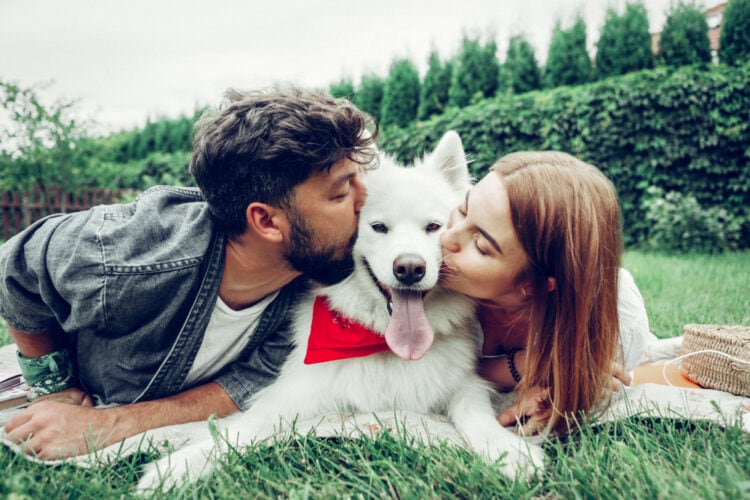Jaycee and Ian were dating for about nine months in Atlanta when they decided to adopt an Australian shepherd puppy. They met and fell in love with fluffy little Bernie. A little over a year later, the relationship ended, but nobody wanted to break up with the pup.
So the couple came up with an informal custody agreement: They’d share time, expenses, and decisions about Bernie’s care.
“Ian had no obligation to share him with me as, on paper, Bernie belongs to him. But he loves Bernie so much, as do I, and he knew that keeping him from me would hurt Bernie which, in turn, would hurt the both of us,” Jaycee said. “Our relationship ended amicably as well so coming to a mutual decision to share him wasn’t difficult.”
If a breakup isn’t so friendly, people might argue over who gets custody of the pets. While you might think your dog or cat (or bird or horse) is an important member of your family, courts view animals as property. Whoever can prove that they bought or adopted the animal is often the one who gets to keep them after a split.
“In most states, pets are treated as property and one party or the other will be awarded custody of the pet. There are some states, however, moving towards awarding shared custody of pets,” said Thad Woody, an Atlanta family law attorney who has practiced for nearly 20 years and also serves as chair of the American Bar Association Family Law Section.
“The issue, of course, is that litigation of any type is expensive and only clients with the resources to fight over pet custody tend to do so,” he said.
Woody said he sees pets in more than half of his divorce cases, but pet custody comes up in only about 10% of those cases.
“Those clients that I have worked with on pet custody issues in the past are very passionate about not sharing the pet or providing only a limited amount of time for the pet to spend time with the other party,” he said. “I know sometimes, in divorce, common sense seems to go out the window when people are angry at another party, but most of the time people are able to work through these issues without involving the court system.”
What courts may consider in a pet custody case
Courts can take several things into consideration when deciding a pet custody dispute, according to the Animal Legal Defense Fund. They might examine:
- Who bought or adopted the animal?
- Who is responsible for most of the animal’s care?
- Who will offer the better quality of life for the animal?
“Fortunately, courts are increasingly weighing animal interests in custody disputes. Some states have enacted legislation requiring courts to consider animal interests in divorce proceedings,” said Christopher Berry, managing attorney, Animal Legal Defense Fund. “In other states, courts may be able to consider animal interests in custody disputes based on judges’ traditional power to account for the ‘equities’ of a case.”
The organization reports that in 2017, Alaska was the first state to enact legislation requiring courts to weigh an animal’s best interests in custody cases. Illinois did the same thing a year later.
“Although most people prefer to avoid litigation, animal custody disputes are increasingly ending up in court as companion animals are widely considered to be a part of the family as opposed to a mere possession,” said Berry. And that “demonstrates a lag in the legal system keeping up with societal views toward animals.”
In the pet custody cases he’s been involved in, Woody said that his clients used arbitration to create a detailed custody plan. With that process, an agreed-upon arbitrator works privately with the parties and can decide about a dispute.
“Some judges, maybe rightfully so, get frustrated when parties cannot cooperate on dividing up items. Arbitration is a tool by which the parties can pay a third-party neutral to help come to an agreement and, if they are not, then the arbitrator will make those decisions for them,” Woody said.
“Issues like who might have originally cared for the animal, who continues to care for the animal, and who might have the time to give the animal are all factors to help an arbitrator decide on what might be best for the pet.”
Pet prenups: Prepare a plan for post-Breakup Care
Before bringing Bernie home, Jaycee and Ian had kind of a puppy prenup conversation, discussing what would happen if the relationship were to end. They decided it made sense for Ian to take custody because he had a house with a fenced-in yard.
But a few months into dog ownership, the plan changed. They both bonded with Bernie quickly and he was very attached to both of them.
“I couldn’t imagine not having him in my life and Ian felt the same way. We agreed at that point that we’d never try and take Bernie away from each other. For Bernie’s sake, as well as our own,” she said. “That being said, it still worried me as the end of our relationship grew nearer.”
Now, when Ian travels, Jaycee often takes Bernie; when Jaycee has a particularly hectic work week, he goes to Ian’s.
Designing a pet custody agreement
If you’re working with an attorney, you can address pet custody in your documentation. Typically, an agreement would include basics like the name and type of pet and any identifying information like age, breed, etc.
Then you can spell out financial agreements to address who is responsible for the pet’s care, including veterinary visits and supplies. Decide if one person will make the primary decisions about care, particularly if emergency medical issues arise. Then spell out visitation terms, detailing how physical custody of the pet will be divided.
“It can be as simple as which party gets awarded ownership of the pet and how often the other party can visit with the pet,” Woody said. “The more complex custody agreements are akin to those we see with child custody that scope out specific time frames but also include important information like medical decision making or sharing of costs.”
Jaycee and Ian are using the same plan post-breakup as they did when they were together.
“We both have our ‘Bernie things’ that we pay for, and it’s remained that way,” Jaycee said. “If there’s ever any medical concern, we let each other know what’s going on than we come up with a plan of action.”
She said things have been working out very well so far.
“I feel that if bumps do arise, we’ll figure it out,” she said. “As long as we continue to make decisions with Bernie’s best interest in mind.”
Woody suggests taking everyone’s best interests in mind when deciding where a pet will go.
“My advice for anyone ending a relationship is to look past your own feelings and to find out who else is hurting,” he said. “A pet is often attached to both parties and working collaboratively on issues like pet custody can take long strides towards resolving other issues in the divorce more amicably.”






